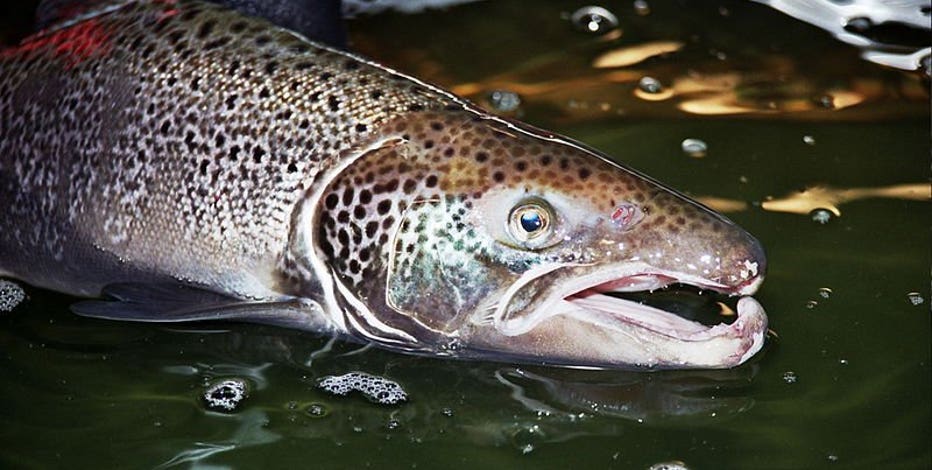Work to remove final fish farming net pens underway in Washington waters

Fish farming net pens being removed in Washington state
Work is beginning to remove the final net pens left in local waters. Still, the fight surrounding the decades-long debate over commercial net pen use in Puget Sound continues.
BAINBRIDGE ISLAND, Wash. - Work is beginning to remove the final net pens left in local waters. Still, the fight surrounding the decades-long debate over commercial net pen use in Puget Sound continues.
One could argue that the fight is ending. Despite court battles over whether Public Lands Commissioner Hilary Franz has the authority to ban net pens in state waters, a crane looms over the last remaining net pens in Washington state out near Bainbridge Island.
"For me, it’s an exciting moment of taking back our local waters for our native fish and native tribes," said Franz, overlooking the facility near Fort Ward Park.
Franz announced an executive order in November 2022 that closed state-owned aquatic lands to net pen fish farming, calling them a threat to the marine ecosystem.
The main concern over commercial net pens comes down to environmental impacts. Proponents of banning net pens point to untreated waste from net pen facilities and various viruses and diseases that can be spread from farm fish to wild fish.
Those concerns grew following the 2017 net pen collapse near Cypress Island. Nearly 300,000 Atlantic salmon escaped. Later reports indicated that a virus was found in fish that were captured and sampled.
"We’ve seen the risk manifest in Puget Sound over the years," said Emma Helverson, the executive director of Wild Fish Conservancy.
"We have harvest issues, hatchery impacts, and habitat loss – these are huge issues and will take years to really accomplish, but this is something we can change with one action that Commissioner Franz has taken."
While some groups, like Wild Fish Conservancy, have celebrated the moves to ban fish pens others have pushed back.
The Jamestown S’Klallam Tribe and the Northwest Aquaculture Alliance are challenging whether the DNR has the authority to ban marine aquaculture. NWAA has stated that the job loss by moves to shut down and disassemble net pens has forced people out of jobs.
"(NWAA) finds it shameful and appalling that a candidate for a high office in this state would choose to celebrate both the loss of an industry and people’s livelihoods," a NWAA spokesperson wrote.
Fish farming, however, may not be gone even if the ban holds.
Washington state has begun talks with a number of businesses about land-based aquaculture alternatives that could allow local fish farming projects to continue, albeit in a different way.
"The similarity is that we both are growing salmon, they stop at that point," said David Roberts, the chief of sustainability at Novia Scotia-based Sustainable Blue."
According to Roberts, Sustainable Blue has created a way of fish farming on land that creates zero discharges of byproducts into local waterways. The waste created during their farming technique is converted into a bio-gas that can be used to create energy.
Roberts told FOX 13 that they’re aiming to create a new future for fish farming that doesn’t rely on ocean-space to farm fish, but also doesn’t rely on ocean-based resources at all. They’re currently working on solutions to feed fish without using any ocean resources.
"We need a model that can be expanded that’s scalable and doesn’t impact our natural resources or use up our resources unnecessarily," said Roberts.


